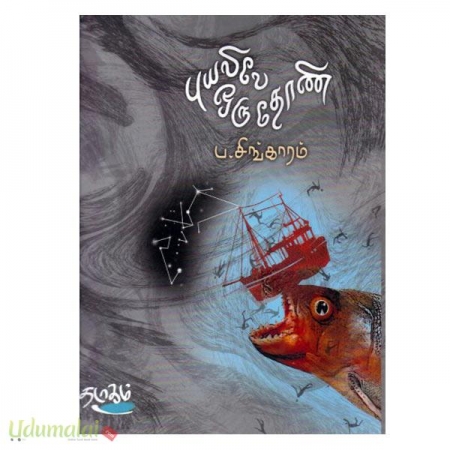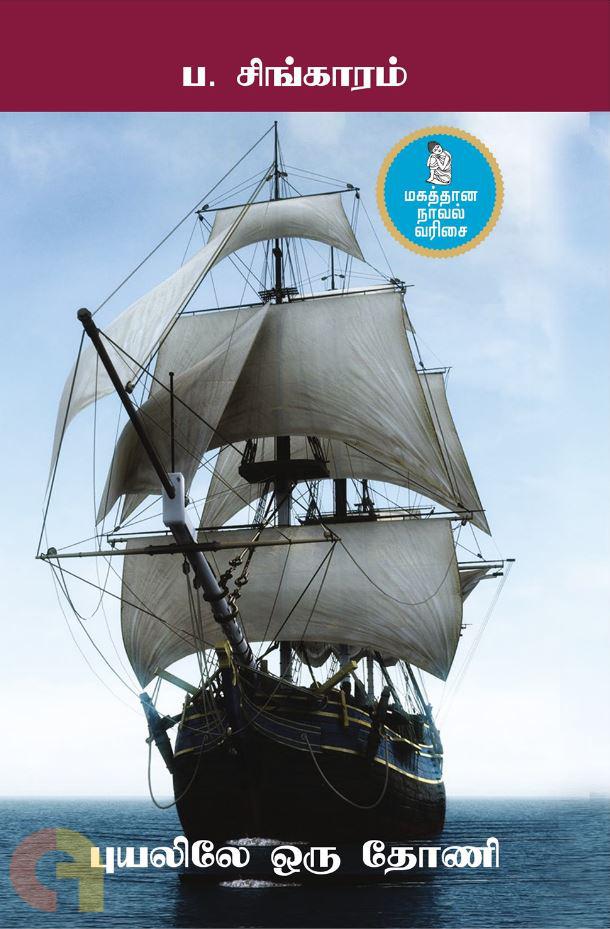Translated into English by Saravanan Karmegam.
Chapter 18: Midway
….
The Japanese Admiral Yamamotho remained restless as he knew that the war between Japan and America would be brought to the end only in the Pacific Ocean region. America’s naval and air power were getting stronger, faster day by day. On the other hand, the condition of Japanese forces became worse. Japan found it extremely difficult to stand against the highly organised army of its enemy possessing robust financial wealth and incomparable ability to build war time infrastructure.
Yamamotho designed a war strategy called “Midway-Aleutian” to hoodwink the American Navy stationed in the Pacific region and pull into a zone of destruction before the latter could gain strength to become an indestructible navy. According to the plan, the striking force of Admiral Nakumo left for the place of operation. A small fleet of navy under the direct command of Yamamotho was patrolling along the Marianne harbour area in readiness to take part in any action if called for.
Reminding the manner in which they marched to destroy Pearl harbour, the air columns of Nakumo under Commander Puchida left for Midway Island strip. But this time, the American Air Force, having been equipped with the intelligence about the surprise attack the Japanese striking force was planning to unleash on them, kept its war planes and columns of tanks ready to face the Puchida’s eagles.
The bombs exploded, tanks fired, planes were burnt and ships were sunk.
When Puchida’s war planes were busy attacking, the columns of powerful American tanks emerged on the south of Midway Island and let loose their bomber planes, torpedo aircrafts and other war planes after accurately assessing that half of their enemy aircrafts had been deployed for attacking and other half was busy fueling at their mother ships. As he was overtly confident of the opportune time of attack, Nakumo didn’t even keep the minimum number of airplanes for peripheral security and had them deployed in war front. This made the task of American war planes pretty easier.
In the war that ensued after that for three consecutive days in the sea front around Midway Island day and night, Nakumo lost four aircraft carriers, several cruisers and destroyers and many war planes.
On the basis of initial radio messages, Admiral Yamamotho arrived at the conclusion that there was only one American aircraft carrier left and ordered Admiral Kondo and Admiral Hosaka to leave immediately to assist the striking force so as to decimate the enemy task forces and got himself ready to leave with his columns for the war front. It was at that time he received the final message from the commander of striking force- “four enemy aircraft carriers are patrolling the war front and he doesn’t have even one in good condition”
Yamamotho had only one small aircraft carrier left at his disposal. As he understood the imminent gravity of the situation, he ordered all three striking forces to withdraw from the war front and retreat immediately.
The important reason why Yamomotha’s Midway attack plan failed was that the American Intelligence agencies were able to decode the secret code language of Japanese Navy. All the secret details pertaining to the date of war, participating columns of striking forces, mode of attack were known as long a month ago to the American navy commanders who had been clandestinely eavesdropping the radio signals of Japanse navy.
Midway was the turning point in the Pacific war front. After that there were conflicts to gain control over Solomon Islands. Quadalcanal Island which once witnessed the heaps of dead bodies and river of blood was now under the control of America and fast becoming the most prominent base station.
Hitler’s army being stopped at the entrance of Moscow city was one of the most important events in the world history. The German troops that entered the southern part of the city captured Pravda building, the heart of the communist propaganda office. Nazi’s Swastika flag was flapping on its top. On the north, German tanks made forceful entry into the city of Kilky that formed the city’s boundary of tram transport.
It was the time of dawn. The final and categorical order was awaiting to be passed anytime to strangle the town and capture it and bombard the Russian government’s Kremlin building and reduce it to shambles.
The columns of panzers and striking forces were standing ready.
It was at that time…
The war cry of Red army was heard. Tanks fired shells shaking the sky and earth. The rolling sounds of monstrous tanks in snowy hues filled in the air. The skiing chariots came down rolling fast along with soldiers of the east in white woolen military attire. General Rokossovsky’s1 Siberian army jumped into the war.
“Siberians have arrived. Siberians have arrived”
The Russian army columns were happy and clamour of cheers rose everywhere.
After dispatching his Siberian army troops to stop the German striking forces who were fast marching on Relev highway, General Jukhav decimated all the defending German forces in waves like intermittent spells of attack.
Wehrmacht troops took to their toes and ran away from the battle field. The world understood what had happened to Hitler’s army in Russian war front was exactly the same that happened to Napoleon’s army long ago.
But most of the Russian generals were not yet confident of taking independent decisions and changing war strategies according to the prevailing ground situations. On the other side, the defensive attack strategies adopted by the German General Manstein2 who was brought back from the southern war front to revive the demoralized German troops started giving positive signals of revival. The German troops stationed in the east could thus escape the total wipe out amidst the harsh cold rainy days amidst looming disaster around them.
The cold winter rainy days were over and spring season set in. The Russian soil grew parched, lost its moisture and became hard. The German army which could somehow stage an escape from the boggy soils of Moscow now rose with renewed vigour to launch fresh attacks.
The ultimate commander Hitler’s order thus came to launch attacks in the southern front.
Strong army columns of nearly twenty lakh men under the command of Field marshal Fyodor Vanbok were marching forward towards east devastating every enemy troops who stood on their way. On the sixth week, Germany’s Kleist Panzer group, the right hand air power entered the Calcium oil fields and the 6th army division under the command of General Boulez reached Wolka River bank and started its offensive action on Stalingrad city.
Suikkov’s troops standing guard at the city found themselves in a very deplorable situation as they were unable to bear the brutal attack of German forces. The commander of Stalingrad send an emergency message for help only to receive a ‘no’ from the newly appointed South Pole Commander Jukhav.
The relentless war continued in every corner of street, almost in every house, in every room for many days and nights and weeks.
Dead bodies were found everywhere. Heaps of rubbles of bombed buildings and the remains of aircrafts that fell down after being shot were found in every corner. Tanks and canons and broken vehicles offered gory picture everywhere.
The most critical time in the life of a soldier on war field in which he would be utterly confused and oblivious of his existence was fast approaching.
At that time…
The army of Varuttin from the north and the army of Yeramenkho from the south appeared all of a sudden like a flash and completely routed the entire troops of third and fourth army divisions of Rumania, subdued them, moved ahead and decapitated the German wings. On the western front, the troops of Rokossovsky emerged as if with some magic power, grew in large numbers and strangled Germans from behind and rendered them helpless with crude attack. Suikkov’s soldiers marched ahead frantically to tighten their noose around the Nazi Germans’ throats.
The ones who came to siege were being sieged.
The circular deployment of Jukhav tightened its noose and kept tightening it further. Sixth division of German army which was once famous for its victories in many battle fields was now lying with broken limps and wailing.
The German War Board ordered the Dane Region Commander Manstein to break the Russian siege and pave way for the sixth division of German Army. In effect, Manstein diverted a part of his troops towards north.
The reinforcements were nearing Stalingrad thirty-five miles away.
That time…
The Malinovsky’s Ukranian army which was waiting in ambush for the arrival of Manstein’s forces waged its attack on the latter and destroyed it.
Manstein and Malinovsky fought the battle tooth and nail for ten days. The “Dane” Commander employed all his hard earned world famous battle skills and tried to sneak into enemy cordon but in vain. Since I-Thermovec war planes and aerial rockets used by the Red army for the first time could destroy the major part of the fleet of tanks, it became an absolute necessity for Manstein, who was left alone without any air power, to retreat so that he would be able to save the panzers which were facing the danger of being wiped out in the Cassia cordon.
And thus, the battle of Stalingrad came to an end.
German Commander Field Marshal Fredrick Van Boulez, along with twenty three generals and ninety six thousand soldiers surrendered before Colonel General Rokossovsky. The total number of German dead bodies collected and burnt were nearly one hundred forty seven hundred and those who were reported missing were nearly hundred thousand.
After this war, there ensued Kursk War which the military strategists still consider as one of the most terrific wars ever fought during the Second War. It was in this war that lasted up to eight long days, the loss reported on both sides stood at staggering three thousand war planes, four thousand tanks, and thousands of soldiers.
It was the last and biggest surprise attack of German army ever occurred on the Russian war front.
In the northern Africa, Filed Marshal Erwin Rommel’s Africa Core Unit which was getting ready to capture Suez Canal was defeated by the recently strengthened eighth division of the British Army at El Ala Fishing harbour. The defeated army unit retreated and took to its toes.
The American troops descended on the Moroccan shores and established their base there.
The emergence of Indian Independence Association did serve as panacea in alleviating the woes of Tamils who were living in East Asian Regions in miserable conditions due to war. Thousands of Tamil youths joined Azad Hind Force, the battle wing of the association, and were receiving military training.
***Chap 18 “Midway” ended***
Note: Chapter 19 “Nee Soon Camp” will be published soon.
Notes:
1. Marshal Constantine Rokossovsky was imprisoned for four years upon the charge of conspiring against Communist Regime. After the invasion of Germany he was discharged and made the General of First Division of Siberian Army. Later he became in charge of a group of military divisions and played a pivotal role in the military campaign that led to victory in Stalingrad and was decked with the rank of Field Marshal.
2. Field Marshal Ericwan Manstein was the best among the German Commanders. He was an expert in offensive attack, defensive attack and devising war strategies. He was the mastermind behind the Western Europe’s Revival in 1940s. It was reportedly said “Stalin had once mentioned that he (Stalin) would have appointed him as the Chief of Soviet Russia’s War Committee had he not been the Hitler’s general.”

